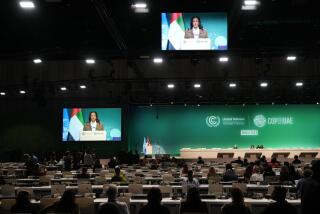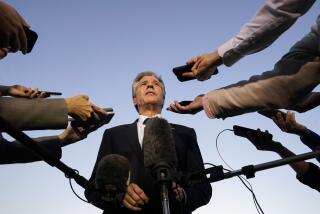Powell Offers Regret to Arabs
DEAD SEA, Jordan — Secretary of State Colin L. Powell appeared before a largely Arab audience Saturday to express American regret for the mistreatment of Iraqi detainees. But the Arab business leaders and dignitaries reacted coolly and said their outrage would not be easily overcome.
Powell said at a World Economic Forum meeting, “We were in a state of disbelief for days, as you were here ... as we saw what our young men and women had done.... Our heads bow, our hearts ache over what a small number of them did” to inmates of the Abu Ghraib prison near Baghdad.
“I can tell you straight from my heart that we will deal with this,” Powell told the international nonprofit organization. “We will see that justice is done.”
The audience, however, fell silent at Powell’s words, which were part of a broad effort to reach out to Mideast audiences who are distressed by the detainee scandal as well as the turmoil in Iraq and President Bush’s recognition of Israeli claims to large West Bank settlement blocks tied to a plan to withdraw from the Gaza Strip.
“This gesture is welcome. But more will be needed, much more than words,” said one Jordanian businessman, who asked to remain unidentified because he is negotiating for work with U.S. authorities in the region.
The businessman said he agreed with a recent comment by Egyptian President Hosni Mubarak that unhappiness with the United States is at an all-time high.
Powell met Saturday afternoon with Jordanian King Abdullah II, Egyptian Foreign Minister Ahmed Maher, and Arab League President Amr Moussa.
In the meetings, “people made it clear to us there was a lot of anger in the Arab world,” a senior American official said. He added that the United States’ friends in the region knew “justice would be done” in the abuse cases.
Powell compared the episode to problems the U.S. faced in helping rebuild parts of Europe and Asia after World War II and the Korean War.
“We’ve always gone through rough patches in the aftermath of these struggles. We’ve made mistakes. But we always succeeded,” he said.
Powell said he hoped the scandal would not make Arab nations lose sight “of the larger picture in Iraq,” including progress in its reconstruction.
He spoke confidently of the U.S. effort to build the next government in Iraq, predicting that the United Nations Security Council would put aside differences over the issue and approve a resolution supporting plans for the transition of authority.
Powell also made a pitch for the controversial Mideast reform program the United States hopes to launch next month at a summit of the Group of 8 organization of eight leading industrialized nations.
The White House’s Greater Middle East Initiative is aimed at helping countries in the region accelerate reforms in education and human rights and move toward democracy and free markets. Powell sought to overcome the perception that the program was designed to impose Western values on the region.
“The United States does not intend to impose reform.... We couldn’t if we wanted to,” he said.
The secretary’s appearance at the meeting was meant in part to support Jordan’s Abdullah, who has helped convince the Arab League to adopt a resolution calling for reform.
More to Read
Get the L.A. Times Politics newsletter
Deeply reported insights into legislation, politics and policy from Sacramento, Washington and beyond. In your inbox three times per week.
You may occasionally receive promotional content from the Los Angeles Times.











